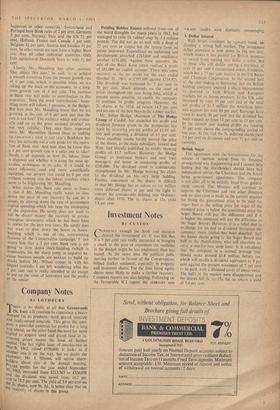Company Notes
By [..0 T 11 BUR y THERFI is no doubt at all that Greenwouds (St. Ives) will continue to experience a heavy demand for its products--sand, gravel, concrete and ready-mixed concrete. This gives the com- pany a powerful potential for profits for a long way ahead; on the other hand the need for more capital to acquire sand and gravel land at in- creasing prices means the issue of further . capital. The last rights issue of one-for-two in March, 1961, raised £550,000. It looks as if another one is on the way, but no doubt the chairman, Mr. J. Silman, will advise share-. holders about this at the annual meeting. Pre-tax profits for the year ended September 30, 1963, increased from £213,565 to £326,038 and the dividend was raised from 16.7 per cent to 18.5 per cent. The yield of 3.8 per cent on the 2s shares, now 9s. 3d., is better than that on the majority of shares in this group. Pataling Rubber Estates suffered from one of the worst droughts for many years in 1963, but managed to raise its rubber crop by .1.4 million pounds. Tea did not do so well with a drop of 33 per cent in output but the return from oil palms improved. Expenditure on replanting and development absorbed £243,000 and machinery another £151,000. Against these amounts, the sale of the Bukit Kosa estate realised a profit of £61,000 on capital account. There was some recovery. in the net profit for the year ended October 31, 1963, at £785,109 against £734,923. The dividend was increased by .5 per cent to 50 per cent. Much depends on the level of prices throughout the year being held, which at present seems possible, to enable the company to continue its profits progress. However. the 2s. shares at 6s. 101d. xd return 14.3 per cent and are one of the best buys in the rubber market.
Mr. Julian Hodge, chairman of The Hodge Croup of Cardiff, has exceeded his profit and dividend forecast given in the prospectus last April by returning pre-tax profits of £1.94 mil- lion and proposing a dividend of .65 per cent. These excellent results hardly moved the price of the shares, as the main subsidiary. Gwent and West, had already published its results showing profits of £1.7 million. However, the Hodge Group, as insurance brokers and unit trust managers, did better in producing profits of £241,000. The dividend cover is considerably strengthened by Mr. Hodge waiving his claim to the dividend on his very large holding. Further assessment of the shares is difficult in that Mr. Hodge has an option on ten million more deferred shares at par and the right to convert his considerable holding into Ordinary shares after 1970. The Is. shares at I2s. yield 5.4 per cent.


































 Previous page
Previous page